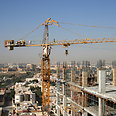
During the discussions, which were held on September 23-24, committee members expressed their concern over the slower marketing of ILA lands.
In the past two years, the government implemented a policy of intensive marketing in a bid to increase apartment supplies and cause prices to drop.
The committee members argued that although the reinforced marketing helped stop price hikes in the housing markets, after two years of double-digit increases every year, this trend may reverse itself.
The drop in the marketing of lands may lead to an apartment shortage while demands are growing.
The increased demand is reflected in a sharp rise in mortgage lending and apartment purchasing. According to Treasury figures, July 2012 registered a record demand for homes with sales of 10,300 new apartments – the highest sales level for July in the past decade.
It should be stressed, however, that the same report noted that the price level in July 2012 was more than 11% lower than the price level in July 2011.
In addition, the Bank of Israel reported in August of a new record in mortgage loan demand. Mortgage lending totaled NIS 4.5 billion (about $1.17 billion) in July 2012 – the highest level in the State's history.
At this stage, the high demand levels have not resulted in a price hike due to the high supply of available apartments (more than 20,000). According to Central Bureau of Statistics figures, the prices of apartments for sale rose 1% in the past year while rent prices went up 3.8%.
But all this might change, Bank of Israel officials fear, if the slowdown in construction and land marketing continues. The level of building starts is below the record registered in mid 2011, and the number of building starts in the past 12 months stood at 41,735 in June compared to 42,764 the previous month.
The slower construction rate in 2007-2011, alongside the constant increase in the demand for apartments (stemming from the population's natural growth and the addition of new households), is considered the main cause of the housing crisis that erupted in Israel in recent years, reflected in an increase of dozens of percentage points in apartment prices within just two years.















